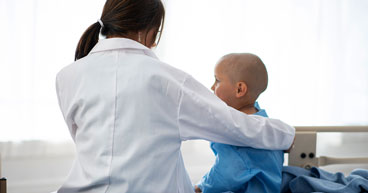
It’s very rare for a child to be diagnosed with cancer or die from the disease. Only 1 percent of all cancers is diagnosed in patients under 20 years old and around 90 percent of children with cancer experience positive treatment outcomes. But the impact of a cancer diagnosis on a child may be felt for decades.
Childhood cancer survivors are as much as 90 percent more likely than other adults to experience chronic health conditions later in life. But new research suggests genetics may also play an important role in predicting childhood cancer survivors’ risk for developing another cancer during adulthood.
“The risk of developing a chronic health condition is related to a variety of factors,” says City of Hope® Cancer Center Duarte pediatric cancer specialist Rusha Bhandari, MD, MS. “This new study helps us better understand how genetic factors can influence the risk of developing a chronic condition for survivors of childhood cancer, in the context of their diagnosis and treatment.”
Dr. Bhandari adds that this field of research may help us develop more tailored screening approaches for the risk factors faced by childhood cancer survivors.
This article explains why childhood cancer survivors may face higher risks for additional cancers and health problems, covering topics including:
- Study reveals childhood cancer survival risks
- What causes the higher risk among survivors?
- What health concerns are most common among childhood cancer survivors?
- Is there a way to lower later cancer risk?
If a child in your family has been diagnosed with cancer and you are looking for a second opinion or to discuss treatment options, call us or chat online with a member of our team.
Study reveals childhood cancer survivor risks
A new study led by scientists at the National Cancer Institute examined data from more than 11,000 childhood cancer survivors. It tracked the links between:
- Survivors’ polygenic risk scores (PRS), which estimate someone’s risk of developing cancer, based on how many known inherited genetic risk factors they have
- Whether they received radiation therapy treatment as a child or adolescent
- Whether they developed breast, thyroid or skin cancer (basal cell carcinoma) as adults.
The results showed that, by age 50, childhood cancer survivors with high PRS values who had also been treated with higher-dose skin radiation therapy were 18 times more likely than average to develop basal cell carcinoma than survivors with low PRS and lower-dose skin radiation therapy. In general, the risk of getting a second cancer was higher than average even under the age of 50.
What causes the higher risk among survivors?
Researchers have already determined the connections between some cancer therapies and higher risk of cancer later in life.
“Many previous studies have established the association between certain types of treatment and development of a chronic health condition,” explains Dr. Bhandari. “For example, we have learned that survivors who received chest radiation have an increased risk of developing breast cancer, and those who received anthracycline chemotherapy have an increased risk of cardiac disorders.”
Bhandari adds that doctors have reduced their reliance on these treatments whenever possible.
Other primary risk factors are certain kinds of gene mutations. While a single gene mutation does not usually cause cancer, having multiple genetic mutations may increase cancer risk.
Knowing that childhood cancer survivors may face both types of risk factors may help doctors understand how best to screen them as they enter adulthood and beyond. City of Hope’s Childhood, Adolescent and Young Adult Survivorship Program does just that, explains Dr. Bhandari.
“In addition to conducting risk-based screening for late effects of cancer treatment, we counsel survivors on their specific risks, recommended screening tests and approaches to staying as healthy as possible,” she says.
What health concerns are most common among childhood cancer survivors?
Childhood cancer survivors face physical and mental health challenges during and long after treatment.
“Some of the most common issues we see and screen for in survivors of childhood cancer are cardiovascular disease, infertility, metabolic or endocrine diseases, and risk of developing another cancer,” says Dr. Bhandari. “It is critical to discuss potential late effects of treatment with our patients so they have the necessary knowledge to make informed decisions about their care.”
There are also common emotional and mental health challenges, according to Nancy Schell, MD, FAPA, a psychiatrist at City of Hope Cancer Center Chicago.
“Patients and their families may have different reactions,” says Dr. Schell. “Some may become fearful of anything that may indicate there is something wrong with their health. Others may develop post-traumatic stress disorder. Anxiety, depression or even survivor’s guilt may develop.”
Some children and young adults who survive cancer can also feel estranged from their peers, having missed out on the typical experiences kids have at school or with their friends. This, in turn, may put a strain on family relationships.
“What is really important is how parents or caretakers respond, because they are key in helping children to adjust,” Dr. Schell says. “And mental health providers should be part of the general treatment team to help both the patient and their family deal with whatever issues arise.”
Is there a way to lower later cancer risk?
Studies have shown that cancer survivors in general are more likely to develop a second cancer in later life. The best ways to lower cancer risk apply to everyone, whether they are a pediatric cancer survivor or not. They include:
- Maintaining a healthy weight and exercising regularly
- Having a healthy diet
- Not smoking tobacco
- Limiting alcohol use
- Limiting exposure to the sun or ultraviolet light
- Avoiding sexually transmitted diseases
- Following your doctor’s screening recommendations
For childhood cancer survivors, screening is particularly important, since catching health issues early is key to treating or preventing them. City of Hope’s survivorship program also offers a multidisciplinary approach to late effects screening, combining experts in oncology, nutrition and psychology.
“Our screening and education programs have led to the early detection of health conditions and subsequent cancers among our survivors, often before the development of concerning symptoms or clinical findings,” Dr. Bhandari says, adding: “It is an absolute privilege to care for our patients both during and after their cancer treatment, as they progress through their survivorship journeys.”
If a child in your family has been diagnosed with cancer and you are looking for a second opinion or to discuss treatment options, call us or chat online with a member of our team.


